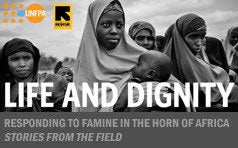News
Desperation Pushes Somali Refugees into Dangerous Territory
- 07 October 2011
News
This is one of a series of features UNFPA is producing about the life in the camps where hundreds of thousands of people have sought refuge from war and famine in the Horn of Africa. The stories document the lives, the loss, the hopes and the fears of some of the most disenfranchised people in the world today.
DADAAB, Kenya — Fatima knew that the journey from Southern Somalia to Kenya’s Dadaab refugee camp could be very dangerous.
“I had heard about bandits raping women along the way, or forcing husbands to rape their wives, but I had to get to Dadaab,” said the 22-year-old mother of two. “It was the only place where my family could get help. My children and I had gone to sleep hungry so many times, I just wanted to flee and get help.”
Only five days into her ten-day journey, Fatima (not her real name) was attacked at gunpoint by bandits who dragged her into the bush and raped her repeatedly. “My children just kept crying as these men raped me. I was too tired to fight back, and I let them do whatever they wanted to do,” she recalls. “They just tore my clothes and after everything, left me to go. I walked for so many miles without a cloth around my body until I got some women in a group who gave me tattered clothes to wrap myself.”

Fivefold increase in sexual violence
On arrival at the camp, Fatima shared her story with camp officials who referred her to a clinic run by UNFPA’s implementing partner, the International Rescue Committee, where she received counseling and was also screened for pregnancy and sexually transmitted infections.
Sadly, many other Somali women have also gone through Fatima’s ordeal.
In July, 2011 Care International stated that reported cases of sexual abuse amongst women and girls in Dadaab had increased almost fivefold -- from 75 in the first half of 2010 to 358 in the same period this year.
Moreover, as the camp population continues to rise, women and girls are increasingly vulnerable to sexual abuse. Many new arrivals are forced to live in the outskirts of designated camps, in makeshift tents situated in poorly lit alleys. Security patrols which roam designated camps are not available to those in the outposts.
Lack of security in makeshift camps
“Refugees who have just arrived settle in the outskirts as they await registration, and because of poor security, women and girls are easily attacked,” says Sinead Murray, the gender-based violence programme manager at International Rescue Committee. “Many are also attacked as they look for firewood and sleeping in crowded places outside the designated camps.”
UNFPA and the International Rescue Committee have started outreach programmes to create awareness among women and girls on the need to report cases of sexual abuse and violence. Initiatives targeting men have also been put in place, to sensitize them on the dangers of sexual violence against women.
“Giving information to new refugees on where to report cases of abuse and providing the avenues to do so is critical in stemming gender based violence. Without this, women and girls remain extremely susceptible to violence,” says Matilda Musumba, the emergency response officer at UNFPA/Kenya.
Providing care to those who report the abuse
UNFPA is distributing post-rape kits and other reproductive health kits to health facilities in the camps. Women and girls who report sexual violence are provided with psychosocial support, HIV counselling and testing, screening for STIs, pregnancy tests and treatment for any infection. At the registration centres, referral systems for new arrivals who report sexual violence have been put in place so they can get help at medical facilities.
Survivors of sexual violence who fail to receive appropriate treatment and counselling can suffer these effects for years, great diminishing their ability to care for themselves or their families. “I know the memories will stay with me for a long time,” says Fatima, “I do feel better somehow because I shared my story and I was counseled and also treated. But it is hard to talk about it.”
— Kenneth Odiwuor